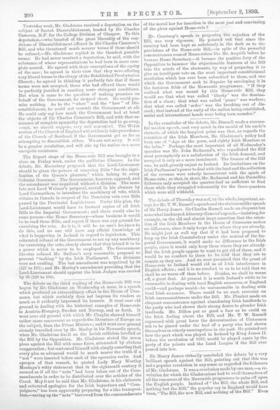Yesterday week, Mr. Gladstone received a deputation on the subject
of Scotch Dieestablishment, headed by Sir Charles Cameron, M.P. for the College Division of Glasgow. To this deputation,—who boasted of the great liberality of the con- ditions of Dieestablishment offered in Sir Charles Cameron's Bill, and who threatened much severer terms if these should be refused,—Mr. Gladstone replied in the blandest possible terms. He had never received a deputation, he said, with the substance of whose representations he had been in more com- plete accord. He agreed with their conceptions of the equity of the case ; be agreed in their view that they were offering very liberal terms to the clergy of the Established Presbyterian Church ; he agreed in thinking it perfectly fair that if those terms were not accepted, those who had offered them would be perfectly justified in exacting more stringent conditions. But when it came to the question of making promises on behalf of the Government, he stopped short. He could pro- mise nothing. As to the " when " and the " how " of Dis- establishment, he could not commit the Government at all. He could only say how much the Government had at heart the objects of Sir Charles Cameron's Bill, and with that as- surance of complete sympathy the deputation had to go away, —not, we should suppose, very well contentel. The Welsh section of the Church of England will evidently take precedence of the Church of Scotland, if the Government get so far as attempting to disestablish either. We arc not sorry. It will be a greater revolution, and will stir up the nation to a more energetic resistance.


































 Previous page
Previous page